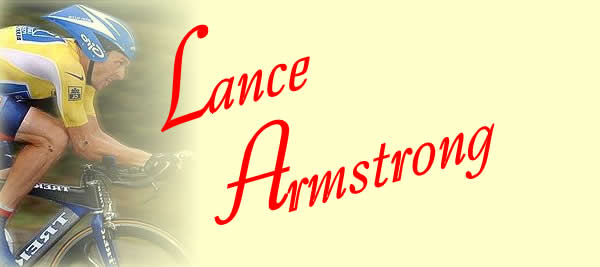
Early Career
He began his sporting career as a triathlete, competing in adult competitions from the age of 18. It soon became clear that his greatest talent was as a bicycle racer. At 17, he received an invitation to train with the Junior National Cycling Team. Plano Independent School District's school board said that the six-week leave to train taken during the second semester of his senior year would bar him from graduating. Armstrong withdrew from his high school, Plano East Senior High, with his mother's blessing and went to train with the team. He graduated from another high school in Dallas the following spring and still harbors resentment toward Plano because of this and prefers his adopted home of Austin, Texas.
After competing as a cycling amateur winning the US amateur championship in 1991 and finishing 14th in the 1992 Olympics road race, Armstrong turned professional in 1992. The following year he scored his first major victory as he rode solo to win the World Road Championships in Oslo, Norway. His victory was so dominant (he had time to blow kisses to his mother in the home straight) that he was invited to an audience with the King of Norway, which he initially turned down after finding his mother was not included in the invitation. Minutes later, the King invited both. Earlier this year, Armstrong had also won the 8th stage of the 1993 Tour de France
His successes continued with Team Motorola, with whom he won stages in the 1993 and 1995 Tours de France and several classic one-day events. Also in 1995, he won the premier U.S. cycling event, the Tour DuPont, having placed second in 1994. He won the Tour DuPont again in 1996, and was ranked number one cyclist in the world. Later in 1996, however, he abandoned the Tour de France and had a disappointing Olympic Games. These early disappointments spurred him on to the great things he has achieved post-cancer, and he admits that if had he given in on the devilishly difficult Clasica San Sebastian he could have retired from the sport.
Later Career: Tour de France
Armstrong's true comeback came in 1999, when he won his first Tour de France. His final lead times over his closest competitor have been over six minutes every year except for 2003 and 2005. In 2003, he finished 1:01 ahead of Jan Ullrich, following an unusual set of circumstances including a stomach illness at the outset of the race, and in 2005, he finished 4:40 ahead of Ivan Basso. In addition to his 7 overall wins, he has won 22 individual stages (1993-1, 1995-1, 1999-4, 2000-1, 2001-4, 2002-4, 2003-1, 2004-5, 2005-1). He has won 11 time trials in the Tour de France; his team has won the team time trial three times (2003–2005).
Armstrong riding in the prologue to the Tour de France, 2004.In his 2004 Tour victory, Armstrong won a personal-best: five stages, plus the team time trial (TTT) with his U.S. Postal Service "Blue Train". He contends that he let his friend Ivan Basso win Stage 12 at the finish line as his way of offering support for Basso's mother's struggle with cancer, though video footage appears to show Armstrong being beaten fairly. He outsprinted Basso to take the next stage, and followed that up by becoming the first man since Gino Bartali in 1948 to win three consecutive mountain stages—15, 16, and 17. For the first time Armstrong also found himself unable to ride away from his rivals in the mountains (except for the individual time trial in stage 16 up L'Alpe d'Huez when he started two minutes behind Basso and passed him on the way up). He won sprint finishes from Basso in stages 13 and 15 and made up a huge gap in the last 250 meters to nip Andreas Klöden at the line in stage 17. He won the final individual time trial (ITT), stage 19, to complete his personal record of stage wins.
Armstrong's 2005 Tour victory took place on July 24. His Discovery team won the team time trial, but he won only one individual stage, the final individual time trial. He looked strong from the beginning of the tour, being beaten in the first stage by only two seconds and passing one of his major competitors, Jan Ullrich, on the road. In the Alps and the Pyrenees he answered all attacks, even when his teammates, whose role was to support him, could not keep pace. Because of wet streets in Paris on the last stage, the referees decided that the final General Classification overall time for the Tour would be taken 50 kilometers before the end, to avoid even more crashes. Armstrong crossed the finish line to cheers of the French and international public, for his seventh consecutive Tour de France win, records for total Tour wins and consecutive Tour wins.
Home | Cancer | Family | Racing
Sources: Wikipedia